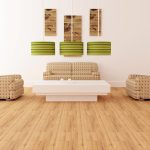When faced with the choice of bamboo or hardwood flooring, it’s important to have a thorough understanding and insight into the strengths, weaknesses, and similarities between the two types of flooring! So let’s find out what bamboo flooring is all about!
Bamboo flooring is a flooring option that is derived from the resilient plant, bamboo. Bamboo is not a hardwood, but rather a hardened herb. Bamboo flooring is manufactured by utilizing cylindrical and vertical bamboo poles, which are processed into horizontal bamboo planks that more closely resemble what you would expect from regular hardwood flooring. Whether it’s a DIY home improvement project to modernize an existing home or a sophisticated decorative foundation for a brand new home, bamboo flooring is the ideal choice.
Bamboo flooring is divided into two main categories: engineered bamboo flooring and natural bamboo flooring. Engineered bamboo flooring is a combination of surface bamboo with plywood or similar material substrate; while natural bamboo flooring is pure solid bamboo. In order to give bamboo flooring a deeper color, it is sometimes necessary to go through a carbonization process; otherwise, the color of the bamboo flooring will be closer to the natural, cork-like tones of the bamboo poles themselves.
Hardwood flooring, as the name suggests, is a flooring option taken from hardwood trees, in contrast to wood flooring derived from softwood trees. Traditional hardwood flooring is primarily derived from wood species such as pine, white oak, and red oak, each type possessing its own unique grain patterns, flooring installation costs, and more. Hardwood flooring is a solid wood floor and is also a strong and durable building material.
Solid wood flooring encompasses both organic materials made from purely natural materials and engineered wood styles of hardwood. The former is made up entirely of natural materials, while engineered hardwood is a composite of raw hardwood and plywood. As for how hardwood is installed, it can vary depending on personal preference: some people like to use adhesives to hold the flooring material in place; others favor the click-lock method of securing side-by-side planks; and, of course, some people choose to nail it directly to the subfloor or on top of the padding.
Bamboo vs. Hardwood Flooring: Five Key Factors You Must Focus On
There are many factors to consider when making your flooring choice. Here are five of the most important advantages and disadvantages of choosing bamboo vs. hardwood flooring:
1. Cost: While bamboo flooring is generally less expensive than hardwood flooring, this is still subject to the specific pricing of each local flooring dealer. Although bamboo offers better value for money overall, it should still be thoroughly evaluated on a case-by-case basis.
2. Durability: Both hardwood and bamboo flooring are extremely durable, especially in areas where family members move around a lot. You can measure this durability with the help of the Janka hardness index – which judges the strength of wood by how well it holds a hard steel ball pressed into it. Bamboo’s Janka hardness rating is above some types of hardwood, but below others. While both types of flooring are effective in resisting dents, wear and tear, and other problems, however, in terms of longevity, hardwood tends to last longer than bamboo.
3. Finishes: Both hardwood and bamboo floors offer a wide variety of finishes to choose from, and you may need to refinish your floor at some point in its life. For cleaning between restorations, it is recommended that you use a mild soap mixture instead of a heavy wax cleaner. Either type of flooring can be used as engineered or laminate flooring, but keep in mind that the choice of finish will have a direct impact on how you sand or restore the wood in the future.
4. Sustainability: Bamboo as an environmentally friendly, renewable resource, whereas hardwood can be difficult to cut, manufacture and recycle in an environmentally friendly way.
5. Water Resistance: Good quality bamboo flooring is slightly better than hardwood flooring in terms of moisture resistance, mainly due to the humid and rainy climate in which it is grown. However, this does not mean that warping and water damage problems will not affect bamboo flooring.

